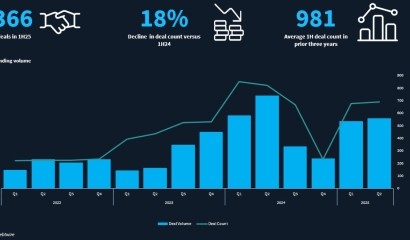CASE PROFILE: Chicken Soup for the Soul Entertainment files for Chapter 11 backed by USD 20m DIP, judge punts first day hearing as prepetition agent and creditors launch fight
Chicken Soup for the Soul Entertainment Inc (CSSE) and 21 debtor affiliates filed for Chapter 11 bankruptcy protection on Friday (28 June) backed by a USD 20m debtor-in-possession financing facility, as the debtors face sharp opposition to certain first day relief.
In the days since filing, certain of CSSE’s first day motions picked up opposition from parties including secured creditor MidCap Financial Trust, Cedar Advance and administrative and collateral agent HPS Partners LLC. The lenders argued that they had not given consent to use cash collateral, while HPS accused William Rouhana, the chairman of CSSE’s board and former CEO of the debtors, of gross mismanagement.
The debtors were set to have a first day hearing today (1 July), but Judge Thomas Horan of the US Bankruptcy Court for the District of Delaware said he was not comfortable moving forward with the hearing given the objections and accusations. The judge agreed to adjourn the hearing to a later date to give parties the opportunity to discuss issues with the first day motions.
The company
The debtors are one of the largest advertising-supported video-on-demand companies in the United States through its three flagship brands: Redbox, Crackle and Chicken Soup for the Soul, according to a first day declaration filed by Rouhana.
CSSE also operates ad-supported television streaming service Redbox Free Live TV, a transaction video-on-demand service and a network of about 24,000 Redbox DVD rental kiosks. The company creates, acquires and distributes film and television series through debtors Screen Media Ventures LLC, Chicken Soup for the Soul Television Group (CSSTV) and Landmark Studio Group LLC. The debtors collectively own a library of content comprising about 28,000 film titles and about 40,000 television episodes, Rouhana said.
CSSE is an indirect subsidiary of Chicken Soup for the Soul LLC (CSS), which publishes a book series and produces pet food under the same name. CSSE was formed as a Delaware corporation in May 2016 and became a publicly traded company in 2017. CSSE currently owns or controls each of the other debtors. Non-debtor Chicken Soup for the Soup Productions LLC (CSSP) is the parent and controlling stockholder of CSSE, and non-debtor CSS owns 100% of the membership interests in CSSP. Rouhana directly or indirectly controls approximately 79.7% of the voting power represented by CSSE’s outstanding Series A common stock and Series B common stock, according to the first day declaration.
The debt
CSSE and Redbox are borrowers under a 2022 prepetition credit agreement that provided for (i) a term loan facility consisting of the assumption by CSSE of all “senior obligations” in connection with CSSE’s acquisition of Redbox in the approximate amount of USD 357.5m; (ii) USD 31.7m funded under a USD 80m revolving credit facility; and (iii) outstanding letters of credit and other financial accommodations, Rouhana said. The debtors drew down another USD 25.9m on the prepetition revolving loan facility upon closing and made an additional draw of USD 22.3m in September 2022, he said.
HPS purportedly asserted that about USD 500.9m in outstanding principal was due and owing under the prepetition secured facility as of 29 April, Rouhana said. The prepetition obligations are secured by first priority security interests in and liens upon substantially all of the assets of the prepetition borrowers and guarantors as of the petition date, subject only to certain permitted liens and encumbrances, he added.
The descent
Prior to filing for bankruptcy, CSSE experienced liquidity challenges that were caused by “repeated commercially unreasonable failures” and the prepetition lenders’ refusals to “live up to their obligations,” Rouhana said.
The ability for CSSE to service the debt it assumed in connection with the Redbox acquisition was predicated on a partial return to pre-COVID levels of theatrical releases available to the company for its kiosk network and cost synergies, Rouhana asserted. The post-COVID rebound in demand for physical kiosk rentals was expected to generate sufficient cash flows to cover the cash needs of the combined businesses, he said.
The debtors’ operating plan and budget called for the company to obtain a working capital loan of up to USD 40m secured by a first lien on the debtors’ accounts receivable, which was believed to be sufficient to enable the company to take advantage of the expected rebound in theatrical releases in the late spring of 2023, Rouhana said. However, HPS did not approve a loan facility offered by a “reputable private lending fund” on terms compliant with the prepetition credit agreement.
The debtors’ inability to secure the accounts receivable loan hampered their ability to pay for and secure new content, which began to strain relationships with their creditors and content providers, he said. CSSE was unable to pay for all the movies offered by providers, operating results failed to meet management’s expectations and cash flows and working capital were insufficient to operate the business efficiently, he said.
CSSE began evaluating strategic initiatives in 2023, including optimizing the kiosk network, implementing workforce reductions, maximizing cost synergies and retaining Solomon Partners as investment banker, Rouhana said. The debtors also procured three additional non-binding term sheets from third-party lenders and engaged in discussions to modify the terms of the prepetition credit agreement, he said. Those discussions included extending the terms under the agreement, converting prepetition obligations into a minority and non-controlling interest in CSSE’s Class A common stock and allowing the debtors to close up to an additional USD 195m of financing, Rouhana said.
The debtors’ capital resources continued to deteriorate through 2023, despite CSSE raising USD 5.9m through private placements of Series A preferred stock. As a result of the diminished capital position, the debtors received an increasing number of termination and/or non-renewal notices from content suppliers and other service providers, Rouhana said.
CSSE reconstituted its board of directors on 28 June with the reappointment of former director Chris Mitchell and the appointment of new directors Bart M. Schwartz, Joshua Mandel and Steven Goldsmith, Rouhana said.
The Chapter 11 cases
CSSE’s proposed USD 20m DIP from Owlpoint IP Opportunities JVF I LP provides for up to USD 10m on an interim basis. It also contemplates replacement liens on the DIP collateral, junior to the carve out and priming lien, and a superpriority administrative expense claim, as well as adequate protection in the form of first priority priming liens on all DIP collateral, junior liens on all DIP collateral, liens on all DIP collateral that was unencumbered prior to the petition date and superpriority administrative expense claims.
Secured creditor MidCap Financial Trust filed an objection to the proposed DIP, arguing that it has not consented to the debtors’ use of its cash collateral. MidCap claims to have liens on certain collateral, including film library assets and deposit accounts acquired by the debtors from Sonar Entertainment Inc. MidCap also took issue with the debtors’ purported failure to mention its secured claim or to make any showing of adequate protection as it relates to liens on the collateral.
Cedar Advance also filed an objection to cash collateral, asserting that it entered into a standard merchant cash advance agreement with the debtors in February under which the debtors sold, assigned and transferred USD 5.6m of receivables to Cedar Advance. The debtors cannot use the property they sold to Cedar Advance prepetition as collateral, and the firm objected to the debtors’ request to use cash collateral to the extent they intend to use the property Cedar Advanced purchased that is not property of the estates.
Adding to the opposition to CSSE’s first day relief, HPS Investment Partners filed a motion to reconstitute the debtors’ board of directors, appoint a Chapter 11 trustee or convert the Chapter 11 cases to a Chapter 7 liquidation.
In its motion, HPS alleged that CSSE’s bankruptcy cases are necessary because of the “gross mismanagement and self-dealing” of Rouhana as controlling shareholder, chairman and board of the debtors. HPS accused Rouhana of firing all the directors of the debtors except for himself and terminating and disbanding the strategic review committee (SRC) in violation of an irrevocable proxy, corporate governance documents of CSSE and a contractual agreement with HPS and the secured lenders.
Rouhana also installed a new CEO who, like the newly appointed directors, lacks knowledge about CSSE and its business and has no apparent experience running distressed companies, HPS said. The agent argued that the new parties will be reliant on Rouhana to continue steering the ship in the background so long as the status quo remains.
CSSE also reportedly failed to make payroll for over 1,000 employees and missed payments, which resulted in the termination of their medical benefits, and Rouhana oversaw the debtors’ purported failure to pay over USD 15m in payroll taxes that remain outstanding, HPS said. HPS accused Rouhana of making millions of dollars in payments to insiders and equity holders while CSSE was “bleeding cash.”
The agent asked the court to enter an order reconstituting the debtors’ board of directors and the SRC to include the directors who were purportedly terminated by Rouhana. HPS argued that the firing of the directors and termination of the SRC lacked legal basis and was invalid.
“Entrusting the future of the Company to the very individual who thrust it into despair is akin to hiring an arsonist to put out the raging fire she began,” HPS said. “These cases simply cannot proceed with Mr. Rouhana involved in any capacity and certainly not without the involvement of the independent directors Mr. Rouhana saw fit to summarily dismiss.”
On the request to appoint a Chapter 11 trustee in the alternative, HPS asserted that the debtors’ management has incompetently and grossly mismanaged the debtors’ affairs. Rather than working with its creditors, CSSE preferred “dishonesty and gamesmanship” under Rouhana’s leadership. The agent accused CSSE of having a company representative drop a company check for a loan interest payment in an abandoned building that had not been occupied by HPS for years and was not the address listed by HPS on the credit agreement. HPS also argued that Rouhana approved the filing of pleadings with “blatantly false” statements that seek approval of new financing to make insider payments to Rouhana’s companies.
If the court finds that appointment of a Chapter 11 trustee is not in the best interest of the debtors’ creditors, HPS requested conversion to Chapter 7.
HPS also filed an omnibus objection to the DIP and motions regarding cash management, management services fees and wages, saying that the motions were “not only half-baked, but shocking in their lies, inaccuracies, and lack of merit.”
HPS took issue with the proposed priming of collateral securing the secured lenders’ USD 500m in outstanding first lien debt and use of cash collateral on a non-consensual basis. The adequate protection provided to the secured lenders for the priming of first priority interests and use of cash collateral is in the form of replacement liens, which HPS argued provide no protection at all. The agent also raised concerns with a “mythical” equity cushion of at least 20%, which is allegedly based on a “fatally flawed” and “wildly inaccurate” report from Virtu Global Advisors.
With regard to the cash management motion, HPS opposed intercompany transfers. Rouhana should not be allowed to collect insider payments to the detriment of creditors and the debtors any longer, HPS said. The agent asked the court to delay ruling on the first day motions until it has issued a ruling on the reconstitution motion.
The advisors


















